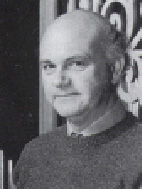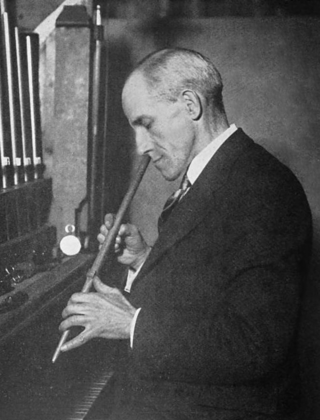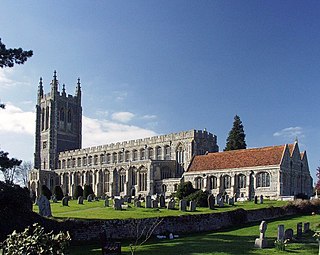
Peter Collins was an English pipe organ builder based in Melton Mowbray, Leicestershire. He specialised in tracker action organs. Collins was an advocate of computer-aided design, using it to produce compact instruments and to control material costs.
Brighton and Hove has numerous notable pipe organs, from the small early 19th-century organs to the large 20th-century instruments in the large churches.

William Hill & Son was one of the main organ builders in England during the 19th century.
Andrew Cantrill-Fenwick is a British-born organist and choral director. He has held cathedral positions in New Zealand and the United States, and was organist of the Royal Hospital School, Holbrook, Suffolk until September 2018. He is a Fellow, prize-winner and former Trustee Council member of the Royal College of Organists, and a Fellow of the Royal Society of Arts. He is a tutor for the RCO Academy Organ School, an examiner for the Associated Board of the Royal Schools of Music, an active recitalist, and a sought-after broadcaster, writer and presenter.

J. W. Walker & Sons Ltd is a British firm of organ builders established in 1828 by Joseph William Walker in London. Walker organs were popular additions to churches during the Gothic Revival era of church building and restoration in Victorian Britain, and instruments built by Walker are found in many churches around the UK and in other countries. The firm continues to build organs today.

John Snetzler was an organ builder of Swiss origin, who worked mostly in England. Born in Schaffhausen in 1710, he trained with the firm of Egedacher in Passau and came to London about 1741. When he retired in 1781, his business continued and ended up with Thomas Elliot. Snetzler died in Schaffhausen on 28 September 1785.

St Bartholomew's Church, Edgbaston, also known as Edgbaston Old Church, is a parish church in the Church of England in Edgbaston, Birmingham.

Christ Church, High Harrogate is a parish church in the Church of England located in Harrogate, North Yorkshire, England. It was the first church building to be built in Harrogate and is today home to a thriving congregation and – along with the attached Parish Centre – an important focus of community activities.

Brindley & Foster was a pipe organ builder based in Sheffield who flourished between 1854 and 1939.

John Haywood Compton (1876–1957) was an English pipe organ builder. His business based in Nottingham and London flourished between 1902 and 1965.

James Jepson Binns was a pipe organ builder based in Leeds, West Yorkshire, England.

The Church of the Holy Trinity is a Grade I listed parish church of the Church of England in Long Melford, Suffolk, England. It is one of 310 medieval English churches dedicated to the Holy Trinity.

Holy Trinity Parish Church is the parish church of Sutton Coldfield, West Midlands, England. It is Grade I listed and gives its name to the ward in which it stands, Sutton Trinity.

The Holy Trinity Church is the parish church of the village of Blythburgh in the East Suffolk district, in the county of Suffolk, England. It is part of the Church of England Halesworth deanery in the Diocese of St Edmundsbury and Ipswich, and has been listed Grade I on the National Heritage List for England since December 1966.

St Martin at Oak, Norwich is a Grade I listed redundant parish church in the Church of England in Norwich.

St Andrew's Church, Norwich is a Grade I listed medieval building in Norwich.
The Church of the Ascension, Stirchley (1901–1965) was a Church of England parish church in Stirchley, Birmingham.
Nigel B. Church (c.1940) is a British organ builder who was based in Stamfordham, Northumberland from 1971 to 1998.

Abbott and Smith were a firm of organ builders based in Leeds, England from 1869 to 1964.














